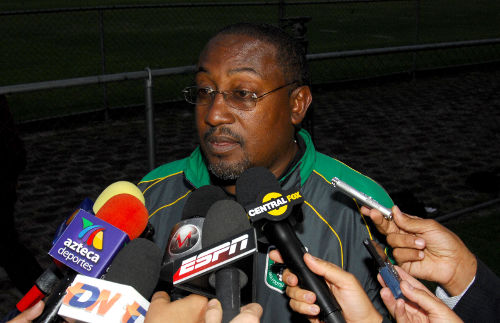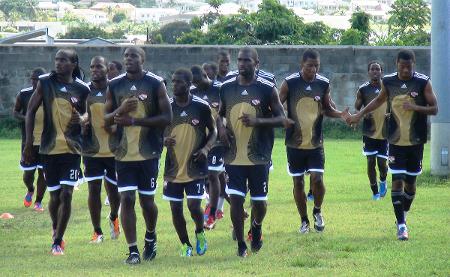Jamaal Shabazz is set to pull off a stunning return to the Trinidad and Tobago national football fraternity at next month’s Caribbean Cup finals in Antigua and Barbuda after being appointed to the “Soca Warriors” coaching staff.
Shabazz, who also coaches local Pro League team Neal & Massy Caledonia AIA, will be officially announced tomorrow as a joint head coach of the senior team alongside Hutson “Barber” Charles. The remainder of the technical staff stays unchanged with Derek King as assistant coach.

“It is like a big dream coming true to work with your own national team,” Shabazz told Wired868, “and be part of a group that has already started the rebuilding process of Trinidad and Tobago football. I feel really honoured that I can even be considered to join the staff at this time.”
New Trinidad and Tobago Football Federation (TTFF) president Raymond Tim Kee said Shabazz was selected after discussions with technical director Anton Corneal. He expects the 48-year-old coach to add his knowledge to a promising but relatively inexperienced coaching staff.
“Organisations are going away from the maximum leaders into more horizontal office charts,” said Tim Kee, who is also a Guardian Life insurance executive. “So when the idea came up in football I am aware of the concept of teaming. I believe they can interchange and complement each other for one common objective.”
The most famous example of joint head coaches in football is the Swedish pair of Tommy Söderberg and Lars Lagerbäck who steered Sweden to the 2002 World Cup and 2004 Euro tournaments.
Charles, a Defence Force Warrant Officer One, told the TTFF Media that he welcomed any move designed to improve the squad.
“It’s something that I welcome,” said Charles. “As I’ve said before, I am in this for the national interest and if there’s anything that can help the team go forward then I will support it.
“Jamaal has had a fair amount of success in the Pro League and he has coached at the national level before. We also know of his success with Guyana.
“I think this is a good move towards seeing the improvement of the national team.”
Charles steered the Warriors to the 2012 Caribbean Cup finals after six unbeaten qualifying games, which included five wins. In contrast, Guyana crashed out of the regional tournament in the semi-final round after several senior players refused the US$12 match fee offered by the Guyana Football Federation (GFF).
But Shabazz is confident of a harmonious relationship with Charles, who is an old friend and former teammate at youth level for Caledonia.
“We had one meeting and we will have several more in the coming days,” said Shabazz. “They have been very welcoming… This generation has got to demonstrate to the past generation that the day of Mao, Gaddafi and Mubarak is no more.
“The idea of mutual consultation is a powerful concept in leadership in Islam.”

(Courtesy TTFF Media)
Shabazz’s return marks the end of a successful stint with Caribbean neighbours, Guyana, who he helped to its first ever appearance in the World Cup semi-final round at the expense of his homeland.
Shabazz coached several Trinidad and Tobago national women’s teams but found it harder to fulfil his ambition with the senior men’s outfit.
A former insurrectionist in the 1990 attempted coup, the Jamaat-al-Muslimeen member spent two years in prison before being granted an amnesty. Shabaz was 25 years old when the Jamaat stormed the Red House but believes the recent Commission of Enquiry has helped to exorcise his demons.
“Since that time (in 1990) to now, I spent my life trying to rebuild the country and make a contribution on and off the field,” he said. “I have spent almost every day that I have been in Trinidad in the Morvant/Laventille community, which I have a deep commitment to and try hard to help uplift.”
Shabazz was first appointed as the national men’s interim coach in 2002 and named Charles as one of his two assistants. But he managed just three training session before he was replaced by Hannibal Najjar.
A year later, Shabazz returned to the men’s set-up as assistant to Serbia-born Zoran Vranes and then St Lucia-born Stuart Charles-Fevrier before departing again in 2004 after the latter coach was replaced.
Guyana came calling and he took the “Golden Jaguars” to the 2007 Caribbean Cup finals and within a point of the CONCACAF Gold Cup. The Jaguars were edged out on goal difference by Cuba.
Shabazz resigned after the Caribbean Cup but was tempted back to the mainland in August 2011, just days before Guyana’s first 2014 qualifier. Remarkably, Guyana played unbeaten until the Jaguars clinched their historic qualification with a 2-1 win over the Warriors in the penultimate group match.
Trinidad and Tobago was coached by German Otto Pfister for close to nine months when it was eliminated. Shabazz spent barely a third of that time with Guyana.

“It was a strange feeling (to eliminate Trinidad and Tobago),” said Shabazz. “I was really happy that we won the game but when I saw the dejected Trinidad players and some of the staff who I know well, it was such a sad feeling.
“I was in the grocery one time and a guy said look the guy who beat himself and that summed it up… But, after seeing the contempt with which the former regime headed by Mr Warner showed local coaches, when that opportunity presented itself via Guyana I felt this was a platform on which I could make a statement for all home-grown Caribbean coaches.
“Unfortunately, I had to be a Warrior against the Warriors. But the statement wasn’t for me; it was for all Caribbean coaches.”
As further testimony to his relationship with Guyana, Shabazz will fly to Georgetown tomorrow to personally reveal his new career path to the media although he has already officially informed the GFF.
“They have given me a wonderful opportunity to develop my career as a coach and I worked very hard for them,” he said. “It is important for me to go and face them and say that it is time for me to go home.”
Shabazz’s spell with Guyana plus his recent success with the Caledonia team, which became Caribbean champions this year, set the stage for his third bite at the men’s senior team.
He plans to pass on his experience at preparing an international team within short timeframes although he will resist suggesting drastic change.
“They had to be doing a lot of things right to reach where they are now,” said Shabazz, “and at a time when you were only hearing negative about Trinidad and Tobago football off the field. I want to play my part rather than impose myself.
“I think Haile Selassie used to say there is no limit to what we can achieve if no one is overly concerned about who gets the credit. We have a real challenge not just to win but also to prove that we can overcome ego and put the interest of Trinidad and Tobago in front.”
Once more, it is an interim appointment and much may depend on Trinidad and Tobago’s performances in Antigua as the Warriors aim for its first Gold Cup berth in six years.
Football fans will hope Shabazz’s third time is the charm.
Shabazz coaching highlights
2002: Gets UEFA ‘B’ license
2007: Steers Guyana to Caribbean Cup final and within a point of the Gold Cup
2008: Steers Caledonia to TTFF FA Cup and Pro Bowl titles. Gets FIFA coach instructor’s license
2011: Steers Guyana into 2014 World Cup qualifying semi-final round at the expense of T&T and helps Caledonia to First Citizens Cup
2012: Steers Caledonia to Caribbean Cup, TTFF FA Cup, First Citizens Cup and Lucozade Sport Goal Shield titles
Editor’s Note: Story updated to include comments from interim head coach Hutson Charles

Lasana Liburd is the managing director and chief editor at Wired868.com and a journalist with over 20 years experience at several Trinidad and Tobago and international publications including Play the Game, World Soccer, UK Guardian and the Trinidad Express.
 Wired868 Wired868 for smart sport news and opinion
Wired868 Wired868 for smart sport news and opinion






